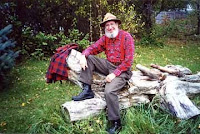 The Wilmington Historical Society will host a program with historian and author Don Williams entitled “Adirondack Tools and Tales” on Friday, July 15th at 7 pm at the Wilmington Community Center on Springfield Road in Wilmington (Essex County). Early Adirondack settlers had to live and survive in a rugged mountain environment with a harsh climate. Mr. Williams will explain how the tools they used were critical to that survival.
The Wilmington Historical Society will host a program with historian and author Don Williams entitled “Adirondack Tools and Tales” on Friday, July 15th at 7 pm at the Wilmington Community Center on Springfield Road in Wilmington (Essex County). Early Adirondack settlers had to live and survive in a rugged mountain environment with a harsh climate. Mr. Williams will explain how the tools they used were critical to that survival.
Don Williams grew up at the ingress of the Northville-Lake Placid Trail and on Route 30. He has authored nine books of Adirondack and local history and has written over 250 articles for magazines including Adirondack Life and the Journal of Outdoor Education. He served as Adirondack regional editor for New York Sportsman Magazine for twenty years. His “Blueline” newspaper column has appeared weekly in four newspapers since 1989. He also hosted the television program Inside the Blueline in Gloversville and Glens Falls for a total of six years.
Don Williams has appeared regularly as an Adirondack lecturer and storyteller at schools and organizations throughout the northeast for over forty years. He appears in the PBS documentary, The Adirondacks. A former school principal and licensed Adirondack guide, he has taught “The Adirondacks” at grade schools, libraries, high schools, colleges and elderhostel. Don lives in his “replicated Great Adirondack Camp” with his wife, Beverly, in Gloversville.
The “Adirondack Tools and Tales” program on July 15th is free and open to the public. Refreshments will be served. For further information, contact Karen Peters at (518) 524-1023 or Merri Peck at (518) 946- 7627.


